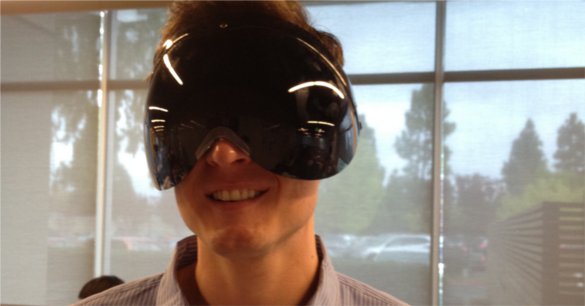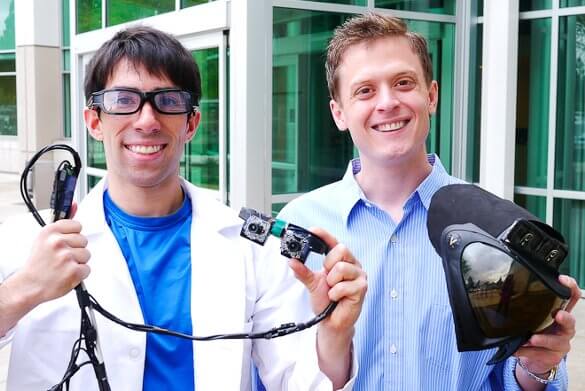There are few fuels as potent as youth and genius, and Vergence Labs is sitting on a powder keg. The fledgling startup in Palo Alto is comprised of Erick Miller and Jon Rodriguez a dynamic duo that want nothing less than to redefine the human-computer interface for the 21st Century. Vergence Labs, recently accepted into Stanford’s prestigious StartX program, is looking to create commercially available devices which will bridge the space between augmented reality, biometric data, computer vision, and digital information in the next few years. They’ve already produced demos for an augmented reality visor that will tell you the names of your friends as you look at them (see video below). Their first real product, however, will be a pair of glasses that allow users to capture video and share it socially, and they’ve just launched a Kickstarter project to help start production. Soon thereafter they’ll be integrating biometric data from wearable sensors, and moving on to bigger, better ways to merge humans and machines.
I talked with Miller and Rodriguez about the future of their new company. Augmented reality, immersive digital/social experiences, telemedicine, preventative health care monitoring…Vergence Labs has so many potential applications for their devices lined up that it’s not really a big concern. These guys don’t want to find a killer app, they want to build the bridges that will unite us with computers. Or, as Miller says, “Reality is our platform.”
Singularity Hub first ran into Vergence Labs at this year’s Future Med at Singularity University, discussing some of the many possible applications for human-computer interactions in the healthcare industry. It’s hard to convey in words the enthusiasm and surprising depth of vision that Miller and Rodriguez provide in person, so a few videos are in order. The first is an introduction from Vergence Labs that quickly jumps through some of their concepts of augmented reality devices, and then demonstrates a great prototype facial-recognition system that culls info from Facebook to identify friends as you look at them.
In the second Vergence Labs video Rodriguez presents another video glasses prototype that augments reality in a few fun ways:
The latest Vergence Labs creation: electric sunglasses. A nice little demonstration of the hardware expertise in this team:
There’s a breadth to Rodriguez’s experience which is astounding for someone so young. Besides robotics, AR, and social media (a former intern at Facebook), he’s also worked with synthetic biology, DNA sequencing, and mobile apps. His honor’s thesis at Stanford this year (yes, he’s a college senior) will focus on harnessing wearable sensors to create a bioelectric interface, “assembling an augmented reality computer with video screens and headphones as output, and inputs consisting of gaze tracking, EEG, finger tracking, and GPS.” He’s most of what one could ask for in a Chief Science Officer and he hasn’t even finished his undergraduate degree.
Here’s Rodriguez, while still in high school, discussing a system to adapt reconnaissance robots with IR vision for military applications. His work here won him an award at the 2008 International Science and Engineering Fair.
Miller’s career is no less impressive. His experience in computer graphics, computer vision, design, and visual effects includes time with some big names like Walt Disney Animation Studios, and Sony. Fantastic Four: Rise of The Silver Surfer, 300, X-Men: The Last Stand, Beowulf, I Am Legend – Miller’s work or leadership is seen in all those films. But he’s not just some movie guy, he’s a recent MBA with a great background in shaping digital worlds ready to take a bigger role in deciding how people actually experience reality.
Why am I spending so much time on Miller and Rodriguez’s backgrounds? Because when you start talking about Vergence Labs it’s easy to get bogged down in the short term applications, and there’s a lot more going on here. Vergence Labs’ first product is going to be a set of camera glasses that share video through social media – that’s a space ZionEyez has tried to enter (I’m still waiting to see if the former Flip camera crew can pull that off). The first demo we see of the Miller-Rodriguez team is a prototype device that uses Facebook to recognize people in real-time – KLIK from Face.com is already in that market with a mobile app. The augmented reality goggles and software that Rodriguez shows off in the second video are fun, but Vuzix hardware, and a variety of different software programs have been available for years. Not only that, but Google just starting showing off their Google Glasses concept and the search engine giant looks like it might try to dominate the field in the next few years. Social video eyewear is going to be competitive to say the least.
So if one just looks at Vergence’s near term projects as evidence one would be tempted to say: “cool, a couple of smart guys are working on some of the neat visual tech I’ve seen before, maybe they’ll help provide some good competition to other companies.” The real message to be received however is “Vergence Labs could be the breakout company that merges our digital and physical senses”.
Because it’s about more than just cameras and augmented reality mobile apps. Vergence Labs is aiming broader in data collection – not just video and audio, but synchronized biometric sensors. In the short term that means that a Vergence system could have applications beyond social media, including preventative healthcare, body monitoring, and personal medicine. Miller threw out tons of great apps in this space including glasses that use computer vision to see and track what you eat, even suggest when you should eat something else and sensors that correlate what you do (as seen in video) with how your body feels, sleeps, or moves. Rodriguez’s honor thesis suggests even more possible ways of transforming a wearable computer (like the glasses and sensor) into a “Total Biolectric Interface” that can provide information the user needs to react to the environment around them. Imagine a pair of glasses that hears everything said to you, converts it from speech to text, searches for keywords, and then overlays graphics and text that you can select using just eye movements – hyperlinks to your reality.
Those sort of long term applications hint at the kind of platforms that Vergence Labs wants to create: observant, immersive, intelligent products that unite physical experience with the growing database of digital information available online. Everything is synched through the cloud, everything can be shared, and everything you want to know can be in front of your eyes in just seconds. Their first products are low-hanging fruit – real time social video through web and mobile computing, augmented reality, and basic body monitoring. Give them a few years of success, however, and Vergence Labs could be creating the prototype devices that just scream of the Technological Singularity and the merger of man and machine.

Miller showing off a concept immersive display system. Vergence is already thinking big in terms of hardware, software, and overall user experience.
More general (equity) fund-raising will happen soon, and in fact would have happened earlier but Miller delayed the round to take better advantage of StartX’s network. The actual products are close as well. The technology to build the immersive displays Rodriguez and Miller discuss in that first video is almost completely ready to go, except for battery/power concerns. Yet even there Vergence Labs is hopeful, looking to extend their current two hour battery life using a suite of efficiency tricks that Rodriguez reverse engineered from the XO laptop (another one of his school projects). If batteries are the weakest link, I asked the two entrepreneurs which were the strongest bits of tech in their stable: “Our screen technology is state of the art…and with computer vision, we are really pretty damn cool.”
In other words, Vergence Labs has some technological surprises up its sleeve, and the vision to apply those innovations with immediate and long term goals. The talent here is wide and deep, and the enthusiasm is like a enormous pitcher of Kool-Aid. Should you drink it? Well, listen to their latest Kickstarter pitch and judge for yourself. These guys may simply be another young company that sets off to change the world and gets stuck making marketable gizmos…or they could be the real deal – one of the hundreds of innovators that history will place at the foundation of the development of the Singularity. Either way, I find myself very hopeful about what Vergence Labs will be able to show us in the years ahead.
[image and video credits: Jon Rodriguez and Erick Miller (Vergence Labs)]
